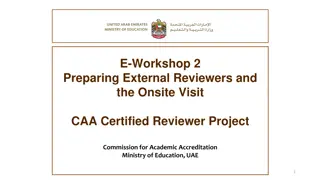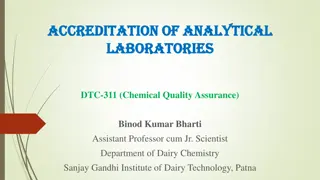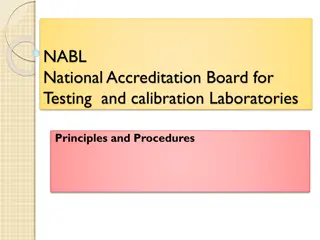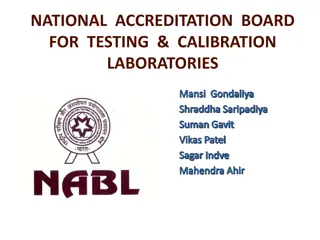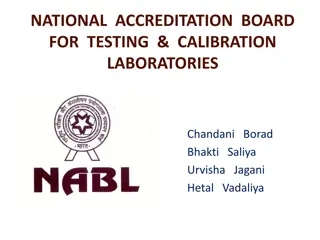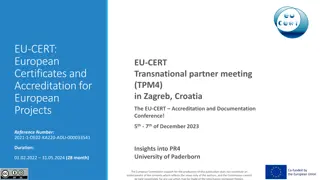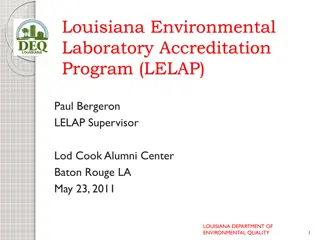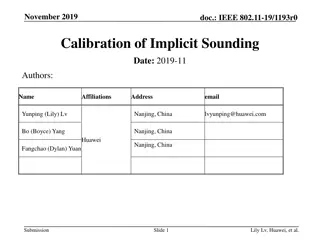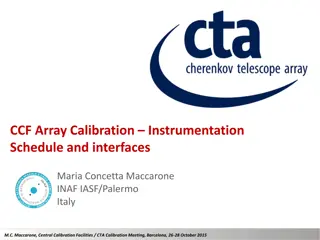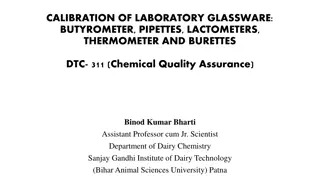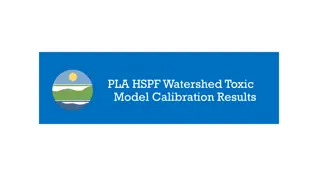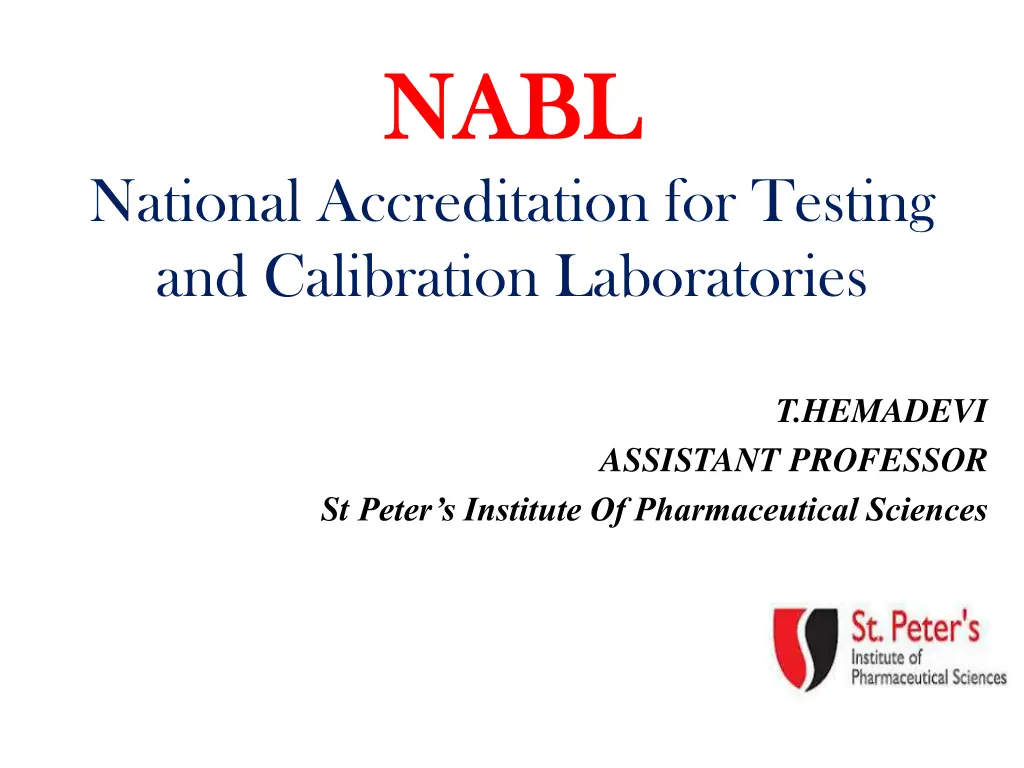
NABL Accreditation for Testing and Calibration Laboratories in India
"Learn about NABL, the National Accreditation Board for Testing and Calibration Laboratories in India, responsible for assessing and accrediting labs to ensure quality and consistency in results. NABL follows international standards and offers accreditation services to various types of laboratories including testing, calibration, and medical labs."
Download Presentation

Please find below an Image/Link to download the presentation.
The content on the website is provided AS IS for your information and personal use only. It may not be sold, licensed, or shared on other websites without obtaining consent from the author. If you encounter any issues during the download, it is possible that the publisher has removed the file from their server.
You are allowed to download the files provided on this website for personal or commercial use, subject to the condition that they are used lawfully. All files are the property of their respective owners.
The content on the website is provided AS IS for your information and personal use only. It may not be sold, licensed, or shared on other websites without obtaining consent from the author.
E N D
Presentation Transcript
NABL NABL National Accreditation for Testing and Calibration Laboratories T.HEMADEVI ASSISTANT PROFESSOR St Peter s Institute Of Pharmaceutical Sciences
The National Accreditation Board for Testing and Calibration Laboratories (NABL) undertakes the assessment and accreditation of testing and Calibration Laboratories, in accordance with the international standard ISO/IEC 17025 and ISO 15189. NABL is an autonomous body under the aegis of Department of Science & Technology, Government of India, and is registered under the Societies Act. It is only one of its kinds that assess laboratories in India for quality and consistency in the results. NABL has agreements with ILAC (International Laboratory Accreditation Conference) and APLAC (Asia Pacific Laboratory Accreditation Cooperation).
AIMS AND OBJECTIVES NABL has been established with the objective to provide Government, Industry and Society in general with a scheme for third-party assessment of the quality and technical competence of testing and calibration laboratories. Govt. of India has authorized NABL as the sole accreditation body for Testing and Calibration laboratories.
In order to achieve this objective, NABL provides laboratory accreditation services to laboratories that are performing tests / calibrations in accordance with NABL criteria based on internationally accepted standard for laboratory accreditation ISO/IEC 17025.
TYPES OF LABORATORIES SEEK FOR ACCREDITATION The laboratories should be legally identifiable & appropriately registered. They can be a part of a big organization or an independent entity. NABL accreditations is currently given in following fields: Testing laboratories Calibration laboratories Medical laboratories
TESTING LABORATORIES CALIBRATION LABORATORIES MEDICAL LABORATORIES Biological Electro-Technical Clinical Biochemistry Chemical Mechanical Clinical Pathology Electrical Fluid Flow Haematology & Electronics Thermal & Optical Immunohaematology Fluid-Flow Radiological Microbiology & Serology Mechanical Histopathology Non-DestructiveTesting Cytopathology Radiological Genetics Thermal Nuclear Medicine (in-vitro Forensic testsonly) Photometry
IMPORTANCE OF LABORATORY ACCREDITATION The concept of laboratory accreditation was developed to provide a means for third-party certification of the competence of laboratories to perform specific type(s) of testing and calibration. Laboratory accreditation provides formal recognition of competent laboratories, thus providing a ready means for customers to find reliable testing and calibration services in order to meet their demands. Laboratory accreditation enhances customer confidence in accepting testing /calibration reports issued by accredited laboratories.
BENEFITS OF ACCREDITATION For customer Customers can search laboratories Customers can search and identify the laboratories accredited by NABL for their specific requirements from the NABL website or Directory of accredited laboratories. Increased confidence in reports The labs are required to participate in proficiency testing which is again demonstration of competence. So, there is increased confidence in the reports released by the laboratory. The customers get services by credentialstaff. Savings in terms of time and money as it reducesor eliminates the need of re-testing.
For laboratory Use of NABLsymbol The accredited laboratories can issue test reports bearing the accreditation body s symbol or endorsement, as an indication of accreditation. International Recognition Lab accreditation is highly regarded both nationally and internationally as an indicator of technical competence Satisfaction of the staff The staff in an accredited laboratory is satisfied as it provides for continuous learning ,good working environment, leadership.
ACCREDITATION PROCESS 1.An applicant laboratory is excepted to submit to NABL 5 copies of the application and 5 copies of Quality Manual. 2.The Quality Manual will be forwarded by NABL to a Lead Assessor to judge the adequacy of the Quality Manual as to whether it is in compliance with ISO 15189 standards. 3.Thereafter the Lead Assessor will conduct a Pre Assessment of the laboratory for one day. Based on the Pre-Assessment report the laboratory may have to take certain corrective actions, so as to be fully prepared for the final assessment.
4. It is essential for the applicant as well as accredited laboratories to satisfactorily participate in proficiency testing/ Interlaboratory comparisons/External quality assessment programme as Asia pacific Laboratory Accreditation Cooperation (APLAC) Mutual Recognition Arrangement calls for mandatory participation in such programmes. 5.Finally when the laboratory is ready, the lead Assessor and a team of technical assessors will conduct the final assessment. The number of technical assessors will depend on the number of disciplines applied for. 6. The accreditation process involves a through assessment of all the elements of the laboratory that contribute to the production of accurate and reliable test data. These elements include staffing, training, supervision, quality control, equipment, recording and reporting of test results and the environment in which the laboratory operates.
7. The laboratory may have to take certain corrective actions, after the final assessment. After satisfactory corrective actions are taken by the laboratory (within a period of 3 months), the Accreditations committee will examine the report and if satisfied recommend accreditation. 8.The time required for the process of accreditation will depend upon the preparedness of the laboratory and its response to the non- conformances raised during the pre-assessment and final assessment. The total duration ranges between 6 and 8 months. 9.Surveillance and reassessment accreditation to a laboratory shall be valid for a period of 3 years. NABL shall conduct annual surveillance of the accredited laboratories. The laboratories may enhance or reduce the scope of accreditation during surveillance.
10. The laboratories need to apply for renewal of accreditation, at least six months before the expiry of validity of accreditation for which a re-assessment shall be conducted.
Application for Accreditation (by Laboratory) Acknowledgement & Scrutiny of Application Feedback (by NABL Secretariat) to Adequacy of Quality Manual Laboratory (by Lead Assessor) and Pre-Assessment of Laboratory (by Lead Assessor) Necessary Corrective Final Assessment of Laboratory Action (by Assessment Team) by Scrutiny of Assessment Report Laboratory (by NABL Secretariat) Recommendations for Accreditation (by Accreditation Committee) Approval for Accreditation ( by Chairman NABL) Issue of Accreditation Certificate (by NABL Secretariat)



